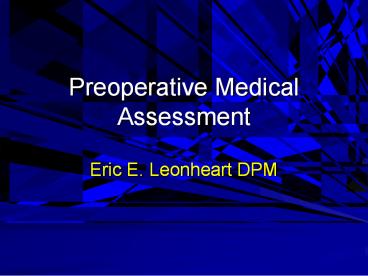Preoperative Medical Assessment - PowerPoint PPT Presentation
Title: Preoperative Medical Assessment
1
Preoperative Medical Assessment
- Eric E. Leonheart DPM
2
Primary Assessment
- History (Detailed)
- Physical Exam
- Review of Rx Medication
- Review of Non-Rx Medication
- Evaluation of Organ Systems
- Advanced Directives
3
Other considerations
- Functional status
- Risk level of the surgery
- Expected blood loss
- Anesthesia type and duration
4
History
- HPI (NLDOCAT)
- PMH
- PSH
- Medications
- Family History
- Social History
- Review of systems
5
Cardiac Evaluation
- American College of Cardiology American Heart
Association published guidelines in 1996
6
Cardiac Evaluation
- Phase 1
- Emergent or elective
- If emergent and the patients life is in danger
proceed with surgery - Undergone revascularization within 5 years
- Received a recent coronary evaluation
7
Cardiac Evaluation
- Elective workup
- PMH, functional status, ECG
- Abnormal findings? non-invasive testing (exercise
stress test, thallium stress, dobutamine stress ) - If abnormal results are found on stress test may
proceed to invasive testing (angiogram,
catheterization - If abnormal results are found may require
coronary artery bypass graft (CABG) prior to
elective procedure
8
Cardiac Evaluation
- Risk stratification
- Helps to determine the necessary work up based on
the risk inherent to the procedure, patients PMH
and functional status
9
Risk Stratification
- High Risk
- Unstable angina, Unstable CHF, Symptomatic
ventricular arrhythmias - Must have their cardiac problems resolved prior
to elective procedure
10
Risk Stratification
- Intermediate Risk
- Mild angina pectoris, stable or prior CHF
- May proceed to surgery if functional status is
good - If functional status is poor (bed-bound or
difficulty walking) additional workup needed
11
Risk Stratification
- Low Risk
- Can proceed to surgery without additional workup
unless - Scheduled for high risk surgery (major vascular
procedure) - AND have poor functional capacity (walk two or
three blocks, climb stairs, light activity around
the house)? additional workup
12
Risk Stratification
- Based on procedure
- High Risk
- Emergencies, Aortic, Major vascular, peripheral
vascular, prolonged procedures w/ fluid shifts
and/or blood clots - Intermediate Risk
- Carotid, Head Neck, Intraperitoneal,
Intrathoracic, Orthopedic, Prostate - Low Risk
- Endoscopic, Dermatologic, Cataract, Breast
13
Antibiotic Prophylaxis
- Bacterial endocarditis
- Recommendations change frequently
- MVP without leaflet thickening and no
regurgitation no abx. necessary - MVP with thickened leaflets and some
regurgitation abx. appropriate
14
Pulmonary Evaluation
- Can obtain pulmonary status from history
- Exercise tolerance, walk up steps with or without
shortness of breath, chest pain with activity - History of asthma, COPD
- Pulmonary function tests can help in patient
management prior to surgery - Arterial blood gas may be drawn on pt. with COPD
to determine if retaining CO2 or hypoxemic at
rest
15
Hematology Evaluation
- History of bleeding disorder, scheduled for high
risk neurologic procedures - Order PT (prothrombin time), PTT (partial
thromboplastin time), INR (international
normalized ratio) - Platelets
- gt100,000 mm³ for major surgery
16
Hematology Evaluation
- Medications
- Anticoagulant held 48-72 hours prior to surgery
- Antiplatelet (aspirin) held 5-7 days prior to
surgery - If patient requires continuous anticoagulation IV
heparin
17
Endocrine Evaluation
- Objective
- Is to rule out diabetes or thyroid disease
- Evaluate control of blood sugar
- Determine whether the patient is experiencing
adrenal suppression
18
Endocrine Evaluation
- Diabetes
- Fasting blood sugar lt 200mg/dL
- If elevated must gain control with oral
hypoglycemics or insulin prior to surgery
19
Endocrine Evaluation
- Thyroid disorders
- Common symptoms, fatigue and constipation
- TSH testing, possibly T3 or T4
- Regulation of TSH is needed prior to surgery
20
Endocrine Evaluation
- Adrenal insufficiency
- Common in older patients
- Even 5mg q.d. for a year can cause adrenal
suppression - Require perioperative supplementation of
corticosteroids - RA patients need C spine x-rays, subluxation of
atlantoaxial joint, hyperextension of the neck?
severed spinal cord
21
Endocrine Evaluation
- Normal supplement of hydrocortisone is
20-30mg/day - Perioperatively increase to
200-300 mg/day usually IV and can taper down if
patient is afebrile and improving on day 4 or 5
postoperative
22
Gastrointestinal Evaluation
- History liver disease
- PT, INR evaluate coagulation
- Albumin testing
- May change anesthesia due to metabolism of agent
- History of ulcers or GI bleeds, may change
post-op oral meds - Opiates can decrease peristalsis and lead to
post-op constipation - Constipation can actually lead to delirium in
patients with mild dementia
23
Urologic Evaluation
- Appropriate for
- Frequency, urgency, incontinence, hesitancy
- May be signs of UTI
- Patients with recent UTI should have U/A repeated
if undergoing orthopedic procedures - BPH may lead to urinary retention post-op leading
to UTI, pain, and the necessity for
catheterization
24
Neurologic Evaluation
- Conditions of concern
- Myasthenia gravis
- Amyotrophic lateral sclerosis
- Parkinsons
- CVA
- Seizures
- Dementia
25
Neurologic Evaluation
- MG, ALS neuromuscular disorders
- Increased complications with general anesthesia
- Greater difficulty with function post-op
- CVA
- gt incidents of clot formation, take perioperative
precautions - SCD, anti-coagulate (LMH), ROM, no tourniquet
26
Neurologic Evaluation
- Seizures
- Inherent risk to themselves during and after
surgery - Delirium
- gt incident with age, MI, hypoxia, hypotension.
dementia, CVA, electrolyte abnormalities, ulcer,
bleeding, constipation, urinary retention,
infection, hypoalbuminemia, medications
(opiates), trauma, pain
27
Psychiatric Issues
- High incident of ETOH abuse
- Benzodiazepine abuse is common
- Smoking history
- Must manage withdrawal
28
Functional Status
- Home environment
- Help at home
- Ability to engage in the duties of daily living
- Discharge planning
- Need for nursing care, SNF placement
- Ability to be NWB or PWB
29
Conclusion
- Varying levels of risk
- Imperative for the surgeon to be aware of at risk
issues - Work with PCP or other specialists
30
(No Transcript)































